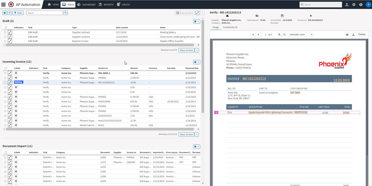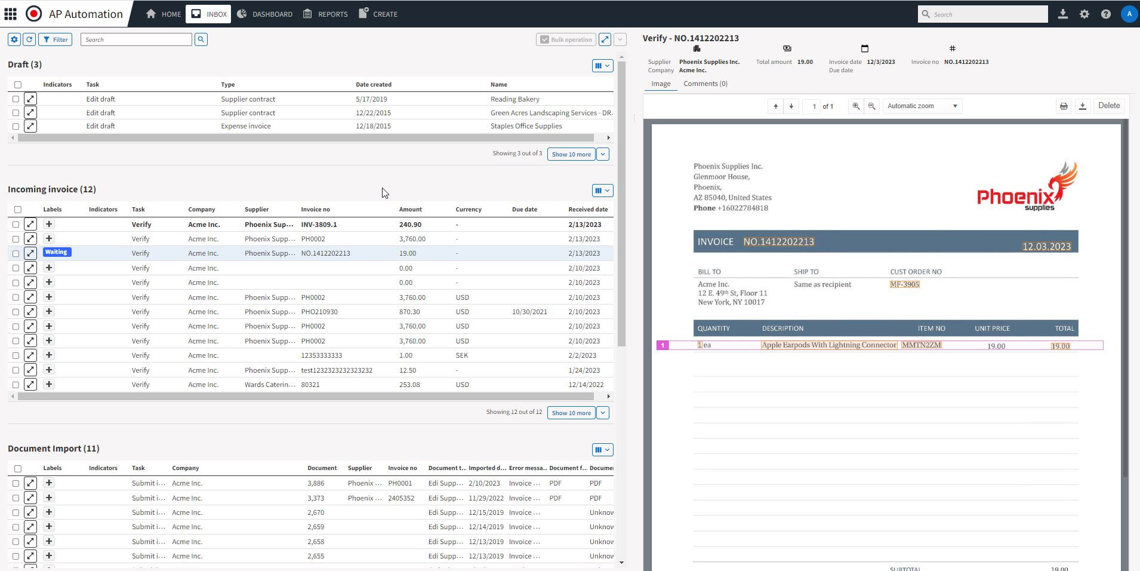

First, let’s define e-invoicing: e-invoicing, or electronic invoicing, is a type of billing that's delivered to the buyer in an electronic format through a preset, structured data exchange. This e-doc exchange between buyer and seller can help simplify and automate some accounts payable cycles, resulting in faster and more efficient transactions – and help companies comply with regulatory requirements, like e-invoice mandates.
What is an e-invoice mandate?
An e-invoice mandate is a regulatory requirement imposed by a government or a governing body that mandates electronic invoicing systems for businesses. It specifies that businesses must generate, transmit, and/or receive invoices in electronic format instead of traditional paper-based invoices and PDFs.
Why are e-invoice mandates important?
E-invoice mandates were introduced to address multiple concerns, but predominantly to prevent tax evasion and fraud and promote transparency. But digitizing invoicing processes has extended benefits that help organizations streamline their operations, reduce errors and increase efficiency. Plus, modernizing invoicing systems with digital tools enables enterprises and governments to enhance visibility and compliance while also gaining valuable insights from the data.
Find out why it’s time to move beyond the PDF and how autonomous AP can alleviate stress for today’s CFO.

How do e-invoice mandates work?
E-invoice mandates require businesses to adopt electronic invoicing systems and generate invoices in a specific digital format that complies with the mandated standards. These invoices are transmitted electronically to the recipient, usually through a government-designated platform or a certified service provider.
Which countries have implemented e-invoice mandates?
Several countries have implemented e-invoice mandates, with Europe leading the way in government mandates. The EU's Project PEPPOL (short for Pan-European Public Procurement Online) mandated the implementation of e-invoicing technology across all EU member states in 2018. This mandate, created in 2014, was created to reduce costs, increase revenue, improve efficiency and curb tax evasion in Europe.
The French government took it further and passed Art. 153 of France’s Finance Law 2020, making e-invoicing mandatory for all domestic businesses. The law was set to take effect in 2024 but has been postponed, and a new effective date will be released at a later time.
The specific requirements and regulations vary from country to country.


Who is affected by e-invoice mandates?
E-invoicing mandates impact businesses of all sizes and industries, requiring both buyers and sellers to comply with government regulations. You must keep up-to-date on the guidelines and utilize an electronic invoicing system to efficiently generate, send, receive and process invoices to avoid financial penalties or legal actions.
What are the benefits of e-invoice mandates?
Businesses can save time and money by eliminating paper and manual processing from invoicing. E-invoicing provides even more benefits by integrating trading partners and other business systems. In particular, accounts payable can benefit from integrating e-invoices into the AP automation solution, enabling touchless invoice processing and freeing resources for more valuable and strategic tasks.
Some of the key benefits of e-invoice mandates include:
Cost savings
Eliminate paper, printing, and postage costs associated with traditional invoices.
Increased efficiency
Reduce manual errors and save time.
Improved accuracy
Minimize the risk of data entry errors and discrepancies.
Enhanced visibility
Gain real-time access to transaction data, aiding transparency and compliance.
Reduced tax evasion
Curb tax fraud and improve tax collection through improved audit trails and verification mechanisms.
Improved sustainability
Increase environmental sustainability by reducing paper consumption and waste.
Increased productivity and employee morale
Increased focus on more strategic, essential tasks, reducing frustrating, time-consuming tasks – increasing employee morale.
Are there any challenges in implementing e-invoice mandates?
While e-invoice mandates are advantageous, you might bump into some challenges during implementation, including:
- Initial investment: You have to have software, infrastructure, and training to comply with the requirements, so it is important to research and build a business case.
- Technical compatibility: Ensuring compatibility between different software systems businesses and tax authorities systems can be overwhelming. Find a resource that can help you navigate thoroughly.
- Compliance complexity: Understanding and adapting to the specific regulations and updates issued by authorities can be complex and time-consuming.

What are the penalties for non-compliance?
Penalties for non-compliance with e-invoice mandates vary across jurisdictions and can include fines, penalties, restrictions on business operations and even legal consequences. Take time to research or ask a resource to help you understand how to adhere to specific regulations in various countries.
How can businesses prepare for e-invoice mandates?
Stay informed
Keep track of legislative changes and updates on e-invoicing in your country. Ask a knowledgeable partner for help when needed.
Assess current processes
Evaluate existing invoicing processes and identify gaps or areas that need improvement to meet the mandated requirements.
Implement compliant systems
Invest in e-invoicing software or service providers that align with the mandated standards.
Train employees
Provide training to staff members to ensure they understand the new invoicing procedures and comply with the regulations.
How can businesses benefit from e-invoice mandates in the long run?
Beyond immediate compliance, e-invoice mandates provide long-term benefits including:
- Streamlining processes and workflows, leading to improved operational efficiency and reduced costs.
- Data-driven insights provide valuable real-time insights, aiding informed decisions and optimizing operations.
- Enhanced business relationships with customers and suppliers by providing faster, more accurate transactions.
- Future readiness to adapt to evolving digital ecosystems and stay competitive in an increasingly digital business landscape.

How can Medius AP automation software help?
Medius AP Automation supports all your invoicing needs and types, including e-Invoices. Collaborating with Pagero and other service providers globally, our cloud-based accounts payable automation solution centralizes incoming invoices under one roof.
Medius Capture, our patent-pending solution, captures invoice data intelligently, bringing consistency to electronic formats, including PDF, XML and many others. The highly user-friendly Medius Supplier Portal enables suppliers to flip and upload invoices from purchase orders.
With Medius, you can manage your accounts payable with ease and peace of mind – and comply with the latest e-invoice regulations. Our team is here to support these types of business changes so you can focus on your business.




